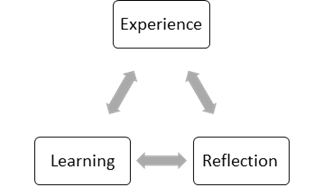Creating a Simple Model of Reflection
This is a quick and easy way to think about an experience you have undertaken and start reflecting on it.
- In the Experience stage, briefly describe an activity you want to reflect on.
- In the Reflection stage, answer these questions: How did I feel during the activity? What went well? What could I have done better? What did I learn?
- In the Learning stage, explain what you will do with the learning. Are there any long-term implications? How does it relate to your development?

from University of Birmingham, 2015: 3)
Use the questions to get you started:
Read the guiding questions below and answer them with relevant notes, thoughts, and reflections on your experiences.
| Reflection Stage | Guiding Questions |
| Experience | What is the activity you want to reflect on? When, where and how did it happen? Who was involved? How long was it? What other information is important for a detailed context of the activity you completed? |
| Reflection | How did you feel during the activity? What went well? What could you have done better? What did you learn? |
| Learning | What were the key learnings you took away from completing the activity? Are there any long-term implications? How does it relate to your development and goals in your Map? |
Exploring other Models of Reflection
There are many models of reflection that you can explore. Mainstream models include: Boud’s triangular representation of reflection; Gibbs’ reflective cycle; Atkins and Murphy’s model of reflection. You can explore this and the other models by accessing this free Open University course.
Your programme might also have a preferred reflection models that you might want to use – you can check this with your course tutor.
Feedback to Inform your Practice
Select the button below to see how you can gain further feedback in your everyday work and study.






